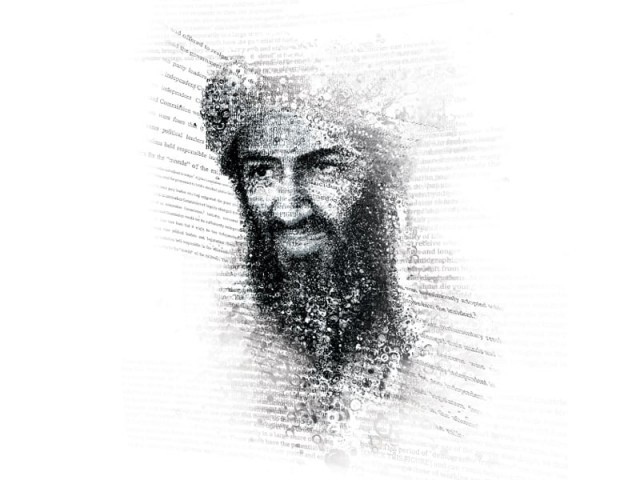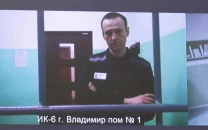Bin Laden was bent on spectacular US attack until the end: files
US releases more than 100 documents that shed new light on the mindset of al Qaeda's founder

Declassified documents show Bin Laden was paranoid about being bugged, emails intercepted. DESIGN: AMNA IQBAL
Documents declassified on Wednesday shed new light on the mindset of Al-Qaeda's founder, his debates over tactics, his anxiety over Western spying and his fixation with the group's media image.
"The focus should be on killing and fighting the American people and their representatives," Bin Laden wrote in one of the newly revealed documents.
Read: Pakistani defector was key in Osama bin Laden operation: officials
The letter was among thousands of files found by US Navy SEALs on May 2, 2011 when they descended on Bin Laden's hideout in the garrison town of Abbottabad and shot him dead.
US intelligence agencies have now declassified more than 100 of these documents taken from Bin Laden's archive, after lawmakers ordered the move and critics accused the CIA of withholding material.
AFP was given exclusive access to the documents in advance of their release.
Jeff Anchukaitis, spokesperson for the US Director of National Intelligence's office, said the release of "a sizeable tranche of documents recovered during the raid" was in keeping with President Barack Obama's call for "increased transparency."
It was also in accordance with a law obliging the spy agencies to review all the Bin Laden materials for possible release, he said
The documents are Central Intelligence Agency translations of the originals in English, and AFP had no way to independently verify the materials or the accuracy of the translation.
The release came shortly after US journalist Seymour Hersh alleged that Washington's official account of the hunt for Bin Laden and the raid that led to his death was a lie.
But CIA spokesperson Ryan Trapani said the declassification had been long planned and had not been intended as a response to Hersh's report.
Read: German spy agency 'helped US find Bin Laden': report
From the strategic and theological discussions to the mundane details of domestic funding and security measures, the documents show the man behind 9/11 preoccupied with once again attacking the West in a spectacular fashion.
Mindful of drone strikes taking out senior leaders, Bin Laden frequently refers to security headaches and advises against communicating by email.
He scolds his followers for gathering in large groups and frets about a microscopic bug being inserted in his wife's clothes.
He lays out plans to groom a new cadre of leaders willing to risk the dangers of joining al Qaeda, and his associates discuss arrangements for smuggling Bin Laden's favorite son and likely heir, Hamza, to Pakistan.
Citing domestic US public opposition to the Vietnam War, Bin Laden argues that the only way to alter US foreign policy is to "start striking America to force it to abandon these rulers and leave the Muslims alone."
Read: Accusations made by Seymour Hersh about Pakistan are baseless: FO
But the documents also highlight deep divisions among the militants over how to wage their terror campaign.
Bin Laden warns that conflict with regimes in the Middle East would distract the extremists from hitting hard at what as far as he is concerned is the real enemy -- America.
"We should stop operations against the army and the police in all regions, especially Yemen," he writes.
The correspondence reflects Bin Laden's "worry that disunity within the global jihadist movement could spell its demise," said a senior US intelligence analyst.
Bin Laden is stunned by the Arab uprisings that erupted across the region from 2010 and urges his deputies to seize the moment of "revolution" and rally Muslim youth.
IS and Bin Laden
Al Qaeda's branch in Iraq, which would later morph into the Islamic State group -- and which now increasingly overshadows al Qaeda -- also comes up in the documents.
Bin Laden and his then deputy, Ayman al-Zawahiri, receive a scathing rebuke in a letter from some Iraqi supporters, who demand they denounce the bloodletting in Iraq.
The Jihad and Reform Front warns Bin Laden that God will hold him to account "for blessing the work done by the al Qaeda in Iraq organisation without disavowing the scandals that are committed in your name."
"If you still can, then this is your last chance to remedy the Jihad breakdown that is about to take place in Iraq, that is mostly caused by your followers," said the letter dated May 22, 2007.
Read: OBL raid: Brig Usman's family strongly denies claims he was CIA's 'walk-in' informant
Bin Laden writes of the need for large-scale terror operations, even though some of his deputies are finding it difficult to organize massive attacks as they try to avert drones overhead and US eavesdropping.
One document recently declassified in a terrorism trial in New York but not released on Wednesday quotes Abu Musab al-Suri, an Al-Qaeda veteran, who advocates going after smaller targets of opportunity as a more realistic approach, intelligence officials said.
"Bin Laden at the time of his death remained focused on large-scale operations while other Al-Qaeda leaders believed smaller operations, or inciting lone terrorist attacks, could succeed at bleeding the West economically," the intelligence analyst said.
Bin Laden failed to win the argument. After his death, al Qaeda's leadership called for lone-wolf attacks, and Suri's idea of "individual jihad" has won out.
The IS group, which was officially excommunicated from al Qaeda, now controls vast swathes of territory in Iraq and Syria and its online propaganda has been blamed for inspiring attacks from Paris to the Dallas suburbs.
Fear of surveillance haunted Bin Laden
Low-hanging clouds over the Pakistani mountains might protect you from a prying US drone, but what if a spy has injected a microscopic bug in your wife's clothes?
Osama Bin Laden's last years at his final hideout were haunted by his accurate hunch that he was hunted by a remorseless and technologically advanced foe.
As he tried to gather his family around him in his Abbottabad compound, he issued ever more detailed instructions as to how they were to avoid leading US agents to him.
According to a letter that was declassified on Wednesday and provided by the CIA to AFP -- which cannot independently confirm its authenticity -- Bin Laden warned one of his wives travelling from Iran to rejoin him to take special care.
"Before Um Hamza arrives here, it is necessary for her to leave everything behind, including clothes, books, everything that she had in Iran... Everything that a needle might possibly penetrate," Bin Laden wrote, in a letter dated September 26, 2010.
"Some chips have been lately developed for eavesdropping, so small they could easily be hidden inside a syringe," he said, according to the CIA's own translation.
"Since the Iranians are not to be trusted, it is possible to implant a chip in some of the belongings that you might have brought along with you."
The letter was one of scores seized along with other intelligence materials when US commandos stormed the Abbottabad compound on May 2, 2011 and shot Bin Laden dead, the end of a long hunt for an elusive foe.
Bin Laden's Saudi wife Khairiah Sabar -- known by the honorific Um Hamza as the mother of the Al-Qaeda's leader's favorite son -- was eagerly awaited, but security was total.
Nevertheless, she was one of three Bin Laden wives present when US Navy SEALs stormed the house. She was left behind and later arrested by the Pakistani authorities.
In other letters, Bin Laden tries to explain to his sometimes reluctant lieutenants why security is paramount, even when it makes running a global jihadist operation harder.
"Concerning using the Internet for correspondence, it is OK for general messages, but the secrecy of the mujahideen does not allow its usage, and couriers are the only way," he wrote.
This did not go down well with his right hand man, Atiyah Abd al Rahman, a commander known in al Qaeda as Mahmud.
"The issue is highly complicated. How can we correspond with brothers in Algeria, Iraq, Yemen and Somalia?" he demanded in one letter, pushing to use online communication.
"Sometimes there is no other means after taking precautions. As for Iraq, we will try, but it is too difficult."
But Bin Laden was implacable on the subject.
Reportedly, it was by tracking one of Bin Laden's couriers to Abbottabad that the CIA was eventually able to pinpoint his location -- there was no electronic communication from the house.
But al Qaeda's security policies went further than that.
"Our security situation here does not allow us to go to doctors, so please take care of all your medical needs, particularly your teeth, and keep the prescriptions from every doctor you go to so we can get the medication when you come to us," he wrote.
And he also warned his mainly Arab allies: "It is also of extreme importance, security-wise, to learn Urdu."
Bin Laden also recommended telephone SIM cards be regularly destroyed and replaced, declaring with misplaced confidence "the facts show that American technology and advanced systems cannot capture a mujahid if he does not make a security violation."
As a reminder, one of the declassified documents is a list of Al-Qaeda cadres who were killed or captured in the wake of the 2001 collapse of Afghanistan's Taliban regime.
Next to each name is the error that spelled their doom: One group was bombed after using a satellite phone, another had associated with known Pakistani agents, others gathered too many vehicles in one place even when a US AC-130 Spectre gunship was overhead.
As surviving al Qaeda members regrouped in Pakistan, the US weapon of choice against them was the drone. The only defense the militants could think of was a cloudy sky.
Thus, in a letter dated November 24, 2010, Mahmud reassures Bin Laden that his wife won't set off on the road until a "convenient cloudy day."
Ironically, all his precautions would come to naught: Mahmud himself died in a drone strike in August 2011, three months after his cautious leader's demise.



















COMMENTS
Comments are moderated and generally will be posted if they are on-topic and not abusive.
For more information, please see our Comments FAQ